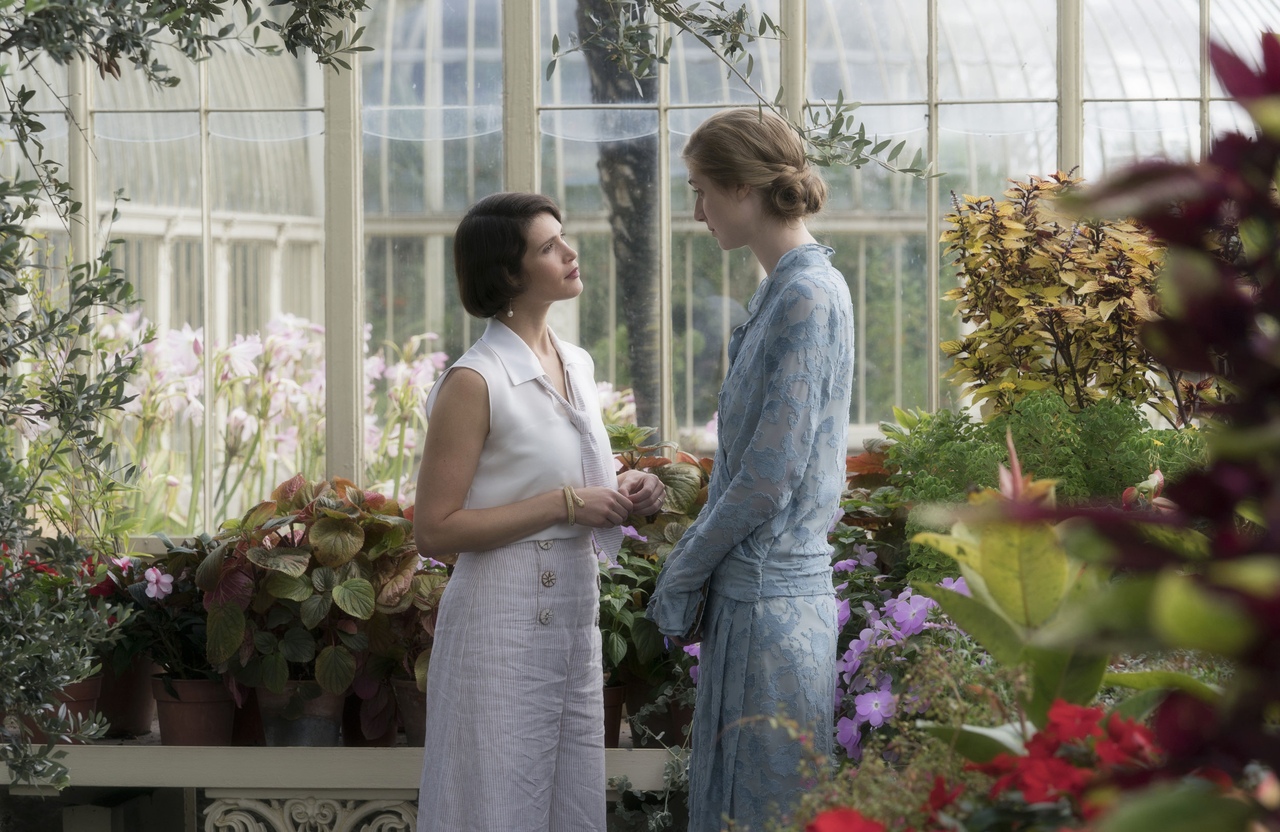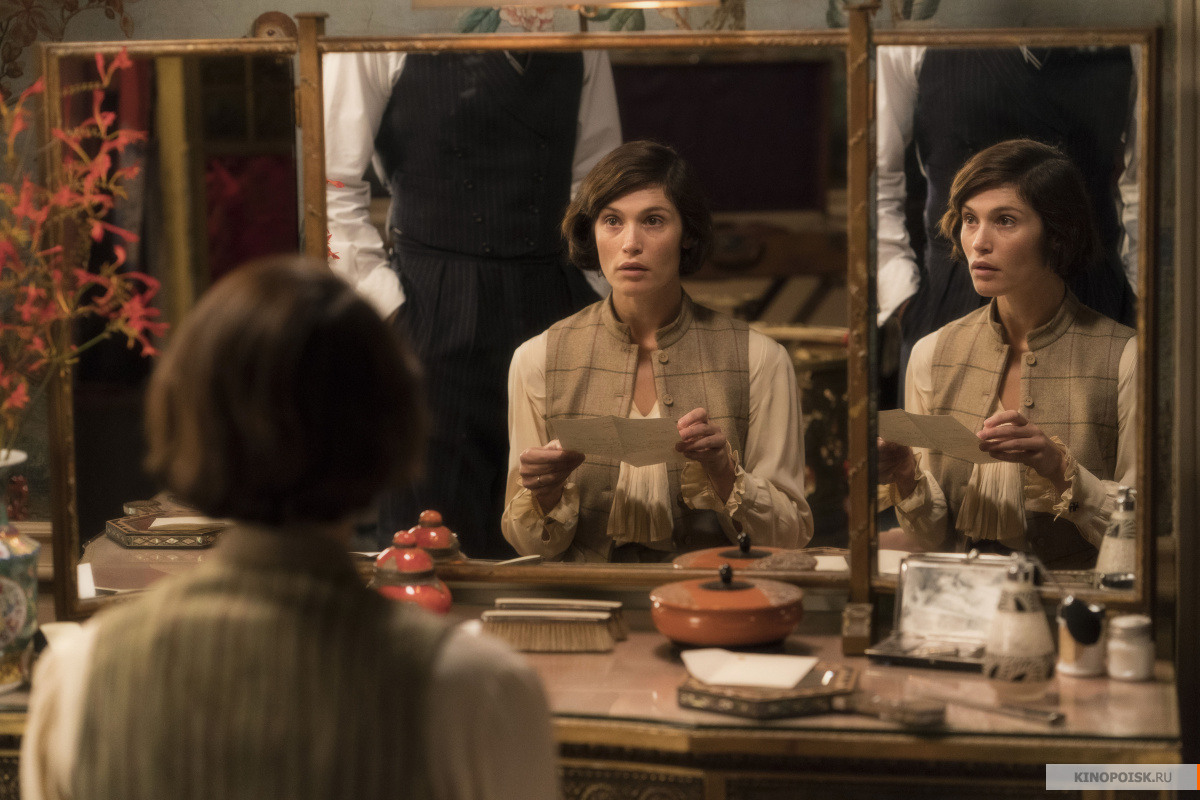“Vita and Virginia” is a captivating biographical drama by a British director, Chanya Button. This film portrays the intricate relationship between two literary icons of the twentieth century, Virginia Woolf and Vita Sackville-West, played by Elizabeth Debicki and Gemma Arterton.

“I am reduced to a thing that wants Virginia. I composed a beautiful letter to you in the sleepless nightmare hours of the night, and it has all gone: I just miss you, in a quite simple desperate human way. “
An excerpt from Vita Sackville-West’s letter, January 21, 1926.

Source
“Vita and Virginia” is an adaptation of Eileen Atkins’ play of the same name, entirely based on the correspondence between the women. “Orlando,” one of Woolf’s most famous novels, described by Nigel Nicolson as “the longest and most charming love-letter in literature,” was inspired by her feelings for Vita, and the film depicts the process of its creation by using vivid, imaginative language and unique visual metaphors.
What I have particularly enjoyed about this film is its meticulous attention to detail. In spite of the low budget, the amount of work done to depict the ambience of bohemian London in the 1920s is positively impressive. Authentic period costumes, picturesque sets, and the splendour of interiors, let alone the delicate shots of Vita’s typed passages and Virginia’s elegant handwriting, immerse the viewers into the literary universe of a different era.
Moreover, the scenes in which actresses read the letters aloud sent shivers down my spine. These moments are filmed in soft focus, accentuating the tenderness with which the women’s words caress each other. No wonder, some may deem the reading of correspondence uncomfortable to watch. Indeed, writing to (and for) a lover is much more intimate than making love in a physical sense, and the film perfectly captures this notion. The viewers, entranced by the epistolary seduction, feel involved in the romance, as its fiery passion and dusky anguish unfurl before their eyes.

Doubtlessly, it is impossible to fit a decade-long relationship into a hundred minutes of screen time, and, therefore, many noteworthy events, like Vita and Virginia’s trip to Paris in September of 1928, had to be omitted. Nevertheless, I appreciate the creative idea of showing the relationship’s chronology through Virginia’s works, rather than explicit time markers. The potential downside of this approach (which, ironically, is also an advantage for the knowledgeable viewers) is that few people know the actual dates Woolf’s novels were published. Six years have passed between the publications of “Jacob’s Room” and “Orlando.” However, the unaware spectators may involuntarily ignore the passage of time, thus failing to grasp the profound yearning within the letters.

Source
The original electronic soundtrack by Isobel Waller-Bridge creates a dramatic dissonance between the conservative time period and the unconventional main heroines, emphasizing that Vita and Virginia were well ahead of their contemporaries. In an interview for “Curzon Cinemas,” Chanya Button mentioned that “The actresses are closely mic’d in each scene, you could hear their hearts beating really loudly during takes, <…> those heartbeats form the rhythm of the score.” According to “IndieWire,” the composer herself confirmed she was inspired by “…their hearts beating together and also separately.” Thus, the music provides a unique connection to the leading performers breaking the boundaries of time and space.

Source
Vita Sackville-West, played by Gemma Arterton, may not possess the androgynous nature that added luster to “Orlando,” but she certainly does have a seductive charm coupled with ardent confidence and youthful energy, which bring her version of Vita to life. She is, all the same, as “pink glowing, grape clustered, pearl hung,” as Virginia perceived her at the beginning of their love affair in 1925. Unfortunately, the script confined itself to the superficial mentions of Vita’s novels, never doing her literary works true justice, although it had an unmatched opportunity to include some excerpts from Sackville-West’s book-length poem, “The Land” (1926), heavily influenced by Woolf’s creative genius.

Source
Virginia Woolf, portrayed by Elizabeth Debicki, is intense and vulnerable simultaneously. “She is both detached and human,” Vita Sackville-West revealed with admiration not long after their first meeting in 1922. Although the actress is much younger than forty, and hardly resembles the original, (except for the willowy frame, paleness, and long, slender fingers), her otherworldly, ethereal energy matches the descriptions of Woolf by those who knew the literary genius in person. Evelyn Irons, for one, having met Virginia in 1932, recalled her as “the moon in the daytime sky,” noting that “age had nothing to do with her appearance; she must have looked like that forever.” Quite like the moon, Elizabeth’s Virginia floats above everyone else – imposing, yet unattainable and fragile. Her intellectual power has a mesmerizing quality, magnified by the deep, husky voice and an exquisite British accent.

Even though many have criticized the portrayal of Woolf’s mental illness in “Vita and Virginia” for being too “surreal,” having experienced psychological distress myself, I have found this representation uncannily accurate. The powerfully evocative delusions experienced by the writer throughout the film were both unsettling and enthralling, thus encouraging the audience to delve deeper into “the most violent waves of emotion.”
In conclusion, I would highly recommend this cinematic masterpiece to poetic souls familiar with the works of Virginia Woolf and other members of the Bloomsbury Group. Unfortunately, an unprepared viewer may be unable to appreciate this movie in all of its brilliance.














I enjoy reading your words.
LikeLiked by 1 person
Thank you! 💖
LikeLike
This is a wonderful review, Veronica. Best, Kevin
LikeLike
Thank you so much for taking the time to read and comment, Kevin! I’m delighted that you like my review. With gratitude, Veronica
LikeLiked by 1 person
Speaking as someone who has dealt with mental health issues… and who as walked in a few surreal places… this was a very engaging review.
LikeLiked by 1 person
Dear Woodsy, I am profoundly happy you enjoyed my review! I’ve also found myself in those ”surreal places” quite often… Although many have criticized this film for ”romanticizing” mental illness, I looked at it from a different, more intimate perspective. It is a joy to know my words resonated with you!☺️
LikeLiked by 1 person
We always risk being accused of romanticising things when we see beyond their obvious faces…
but that’s the poetry of really seeing.
There is a disused thing,
deep down the middle of me,
like a mine shaft on a sad and lonely hill.
There is a pulley wheel,
dredging the darkness that lives in this place.
I could answer it back,
call it an illness
or a lie…
say it doesn’t define me.
I could pretend that solutions I have already stepped in a thousand times are now making better shoes.
I could pretend it’s not a million things that might spin out of orbit before tomorrow.
Or I could simply be myself.
Today,
I am a pulley wheel,
fishing a mine shaft on a hill.
I say carry on seeing with your heart and sharing that voice with the world.
LikeLiked by 1 person
This is such a heartfelt poem, Woodsy! Thank you for sharing it with me. 👏
”I say carry on seeing with your heart and sharing that voice with the world.” Wise words from a beautiful soul!♥️
LikeLike